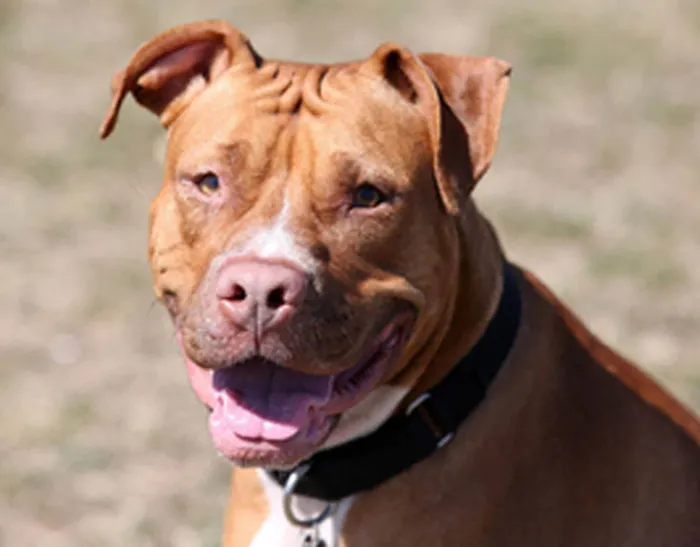Cape Town community publicly kill and set alight 3 pit bulls who attacked a child

Residents in Gatesville, Athlone stoned the three dogs to death. File Picture
Cape Town - As the controversy surrounding pit bulls continues across South Africa, a Cape Town community took matters into their own hands as they killed and set alight three pit bulls that attacked a young girl.
On Sunday, residents in Gatesville publicly killed and set alight the dogs.
This is after a young girl was viciously attacked by all three dogs.
The girl was bitten all over her body, and angry residents chased down two of the dogs and immediately stoned them to death.
The third dog was caught within minutes and also killed.
The dogs were then put beside each other and set alight.
In video footage and photos seen by IOL, a large crowd, including young children, could be seen standing at this scene as the pit bulls were burning.
Residents shouted in agreement as the dogs burnt.
“We are tired of these people wanting to parade with their pit bulls knowing they are a danger to society. It’s not enough our children are being slaughtered by vicious criminals, and brazen gangsters. Now we need to add pit bulls to the list, no. Just no,” a resident told IOL.
According to the Cape of Good Hope Society for the Prevention of Cruelty to Animals (SPCA), this was the second incident it was alerted to at the weekend.
Chief Inspector Jaco Pieterse confirmed a young girl was attacked on the Gatesville field and sustained severe injuries.
He said the girl was rushed to a nearby hospital for treatment.
“The community took matters into their own hands and attacked the dogs – stoning, stabbing, and hitting the animals with various objects before burning them to death.
“SPCA Inspector Jeffrey Mfini, who rushed to the scene after the SPCA received the report, found the dogs still burning. Mfini extinguished the fire, but all the animals succumbed to their injuries.
“The dogs’ bodies were taken to the SPCA premises in Grassy Park, where post-mortems will be conducted.
“We urge the public to contact the SPCA if a dog behaves aggressively or tries to bite someone. We will take the dog immediately. People must not take matters into their own hands – no animal deserves to endure brutality and suffering,” Pieterse said.
He also reminds the public that the Cape of Good Hope SPCA takes in any and all unwanted animals, and the organisation has an open admission policy. An animal will never be turned away, regardless of the breed.
“It is tragic that a child was harmed and, in turn, the animals were brutally attacked. No dog should be roaming the streets. Responsible pet owners ensure their animals are kept within their properties. If your home is not adequately fenced, don’t get a dog.
“Dog owners who wish to give their pit bulls to the SPCA should contact the Inspectorate on 021 700 4158/9 or 083 326 1604 after hours. Community members are also urged to report cruelty to animals to the same numbers,” Pieterse said.
In October, the Sizwe Kupelo Foundation, a non-profit organisation, that advocates for vulnerable children, called for the immediate ban of pit bulls following an attack which resulted in the death of a 10-year-old in Nelson Mandela Bay.
The petition has many South Africans divided as many are calling for the ban as more incidents of pit bulls are reported while others are rubbishing the petition in its entirety.
On Sunday in the Free State, a three-year-old was mauled to death by a pit bull in Henneman.
According to the provincial police spokesperson, Captain Stephen Thakeng, officers were called out at 9.30am.
“On arrival at the scene, members found a large group of community members already outside the yard. The three-year-old toddler was certified dead at the scene with severe injuries to the head.
“The dog was removed by its owner from the scene where the incident took place, but eventually was burned to death by the angry community,” Thakeng said in a statement.
Last week, 49 pit bulls were surrendered to the SPCA in Bloemfontein by their owners.
However, the Cape of Good Hope SPCA says it does not support the petition to ban or outlaw pit bulls but fully supports the motion to develop and implement stronger regulations/legislation regarding the keeping and breeding of the dogs.
“Although the SPCA movement’s mandate is the prevention of cruelty to animals and promoting good animal care, the SPCA also values human lives.
“Not only do people suffer from dog attacks, but other animals are also victims and have been mauled to death. In many instances, the aggressive animals themselves have also been subjected to extreme abuse and cruelty in the manner in which they are kept, trained and even killed.
“This is an issue where both human and animal lives have been placed in danger by irresponsible people who lack the skills and knowledge required to handle power breeds.
“The development and implementation of stronger regulations, such as compulsory sterilisation and permitting in order to keep power breeds, would be a step in the right direction.
“Compulsory sterilisation, at the cost of the owner, would assist in preventing power-breed puppies from being easily accessible to irresponsible people. Compulsory permitting would assist in being able to hold power breed owners accountable for their pets,” Pieterse added.
robin.francke@inl.co.za
Petition against pit bulls moves closer to 50 000 target, organisation wants to hand petition to agriculture minister
‘Each dog should be judged on own merit’, says animal behaviour expert over call for pit bull ban
Owning, breeding of all power breeds should be regulated, says Pit Bull Federation
TEARS says no to pit bull ban
LOOK: Unverified government Twitter account offers R1 500 reward for reporting properties with pit bulls
Pit bull ban: Who is at fault, the dog or the owner?
Pit bull owners are liable for any harm caused, lawyer warns